Waterloo crosstown rivals unite to honor vets
Posted
by Pat Kinney
on Thursday, September 5, 2024
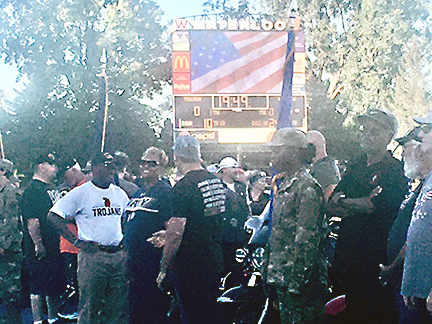
Military veterans, flanked by flag-bearing cadets of the Waterloo public schools Junior ROTC program, gather on the track and under the scoreboard of Waterloo Memorial Stadium prior to the annual football game between Waterloo’s East and West high schools Friday, Aug. 30 (Pat Kinney photo)
WATERLOO — Fans of rival high schools were bonded in a ribbon of red, white and blue Friday night, Aug. 30, as a military appreciation night was held as part of the annual football game between Waterloo’s East and West high schools.
Military vehicles were on hand for a veterans tailgate co-organized by East alum and U.S. Marine 1991 Persian Gulf War veteran Kris Jones. Cadets of the junior ROTC programs of both schools participated in opening ceremonies. Veterans were asked to mass around the cadets on the field, as they were able, or be recognized from their seats.
A “Thunder Salute” was delivered by motorcyclists with the local Combat Veterans Association chapter, Vet bikers revved up their engines en masse after the National Anthem was played.
And two alums of each school, members of the same family who each served a career in military service, were the honorary team captains.
Retired U.S. Army Maj. Gen. Evan “Curly” Hultman, 99, captained the East High squad. He is a member of the East High Class of 1943. And he was a member of the Trojans’ 1942 Iowa state championship team. His coach was Leonard Raffensperger, who went on to coach the University of Iowa Hawkeyes.
Hultman is a former Iowa attorney general, U.S. district attorney, the 1964 Republican gubernatorial nominee and he headed the Reserve Officers Association of the United States and the International Confederation of Reserve Officers (CIOR), associated with NATO. As a student in the 1940s, competing for East in track at the Drake Relays in Des Moines, Hultman met then-WHO radio sports director Ronald “Dutch” Reagan, under whom he later served with the ROA when Reagan was president.
Captaining the West High Wahawk squad was his daughter, retired U.S. Army Col. Heidi Warrington, a 1973 West High alum. She served in a medical unit attached to the U.S. Army 101st Airborne Division and served in Kosovo in the late 1990s. She was a recognized authority on post-traumatic stress and veteran suicides and is a member of the Black Hawk County Veteran Affairs Commission. She also volunteers with the Iowa Court Appointed Special Advocate (CASA) program, working and advocating for neglected and abused children in the court system.
Presenting the game ball was 1982 East alum and Black Hawk County Veteran Affairs Commission executive director Yolando Loveless, a career Navy warrant officer with several combat deployments. He was accompanied by his wife and fellow retired career Navy warrant officer Chiquita Loveless, dean of students for family and military programming at the University of Northern Iowa.
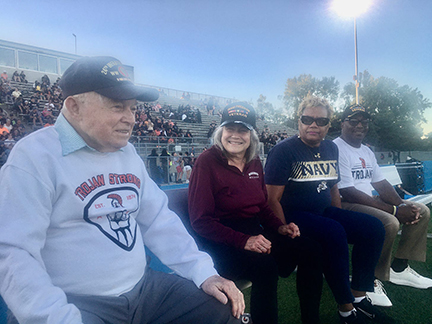
From left to right, honorary team captains Evan “Curly” Hultman and Heidi Warrington, and Chiquita Loveless and game ball presenter Yolando Loveless, all wait to take the field for the coin toss at the start of the football game between Waterloo East and West high schools at Waterloo Memorial Stadium Aug. 30 (Pat Kinney photo)
The East-West football rivalry dates back more than 100 years, to the early 20th century were there were separate East Waterloo and West Waterloo school districts.
The military service of graduates of both schools dates back nearly that far too. Waterloo’s American Legion post, founded in 1921, was named for crosstown football opponents and brothers in arms who gave their lives in World War I, Fred Becker and Carl Chapman.
Becker, an East High graduate, was the University of Iowa’s first-ever first-team All-America football player as a sophomore offensive tackle in 1916. He was a U.S. Marine Corps second lieutenant who, according to Waterloo Courier files, was killed in action leading his men in destroying a German machine gun nest near Vierzon, France on July 18, 1918. His unit had been in constant combat and he had been wounded previously, returning to action. He is laid to rest in a circle of World War I veterans graves at Waterloo’s Fairview Cemetery.
Chapman was a graduate of West High, where he captained the football team his senior year, playing offensive halfback. He attended Amherst College in Massachusetts and volunteered as a fighter pilot in the famed Lafayette Escadrille, a squadron of American pilots who flew for France. He was later transferred to the 94th Aero Squadron of the U.S. Army Air Service. According to Courier accounts and the Air Force Research Institute at Maxwell Air Force Base in Alabama, Chapman was shot down and killed as he and several comrades, including American air ace Eddie Rickenbacker, were involved an aerial dogfight with several German planes over Toul, France on May 3, 1918. Chapman downed one enemy plane himself before going down in flames. He is laid to rest at the Lafayette Escadrille memorial near Paris.
Becker and Chapman, both 22 when they were killed, were each awarded the U.S. Distinguished Service Cross and the French Croix de Guerre for valor in combat. Becker also received the Silver Star. He is in the University of Iowa Athletics Hall of Fame and a Waterloo elementary school is named for him.
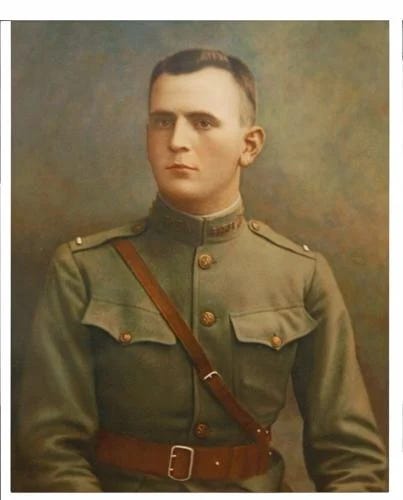
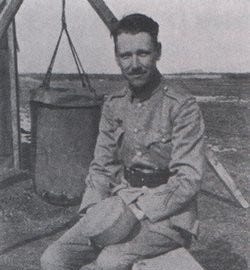
Waterloo American Legion post namesakes Fred Becker, at top, and Carl Chapman (Becker-Chapman American Legion Post 138,/American War Memorials Overseas Inc.)
The football rivalry between the two schools is almost as storied among longtime Waterloo residents as the military service of some of the graduates. It became so intense in the late 1960s and early ‘70s that in some years the games were moved from Friday nights to Saturday afternoons to quell some of the peripheral disturbance and violence which occurred then, concurrent with racial unrest in Waterloo prior to desegregation in schools across the city.
Nonetheless, late longtime East athletic director and former Hawkeye basketball standout Murray Wier said, in a 1977 interview with the author of this column, that the athletes themselves were told to keep their heads high and did just that, remaining above the fray around them. Wier’s voice broke with emotion during the interview as he spoke with pride of the athletes.
Many graduates and athletes of both schools in that era also served, fought and died during the Vietnam War. The West High Class of 1965 alone had five classmates who were killed in action in Vietnam. Nearby Waterloo Columbus and Cedar Falls highs also lost graduates in the conflict.
Against the backdrop of all that turbulence, both East and West highs enjoyed football success, posted several winning seasons during that period and were a source of much-appreciated community pride. East in particular had a legendary run, winning 55 games in a row from 1965 through 1971 and five consecutive state titles. That was when the championship was determined by a poll of sportswriters, before the present playoff system was established.
The rivalry’s intensity faded in recent years with declining enrollment at East which had a long losing streak and in recent years dropped from its longtime status in Class AAAA in football to Class AAA.
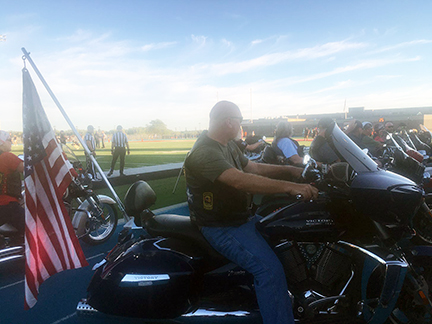
With his bike bearing an American flag in the sunset, Jeff Schmidt of the Combat Veterans Association led a caravan of military-veteran motorcyclists as they rolled into position for a “thunder salute” at a veterans tribute during the football game between Waterloo’s East and West high schools at Waterloo Memorial Stadium Aug. 30, (Pat Kinney photo)
This year’s game could be one of the last between the two schools if Waterloo voters Nov. 5 approve a $165 million public measure to merge the high schools and build a single new building on a site near Central Middle School, once itself a high school, and Waterloo Memorial Stadium. If the measure passes, the new school could be open in 2028-29.
Regardless of the outcome of that vote, East High Athletic Director Tim Moses — a younger brother of late 1970 national high school All-American running back and Iowa State Cyclones standout Jerry Moses — said he hopes the military recognition night continues annually and grows. Because he said, when it comes to honoring veterans, regardless of which school students or alums attend or attended, “we’re all one.”